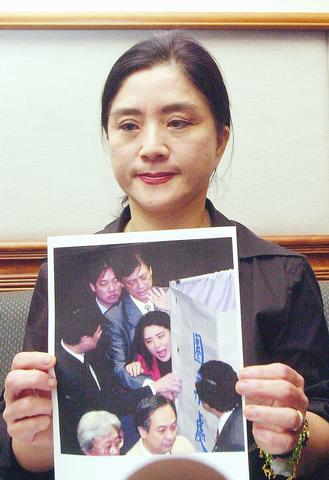After the DPP Central Review Committee decided to expel her from the party on Monday, legislator-at-large Chiu Chang (
Chiu alleged that the DPP completely ignored the facts and used political force to interfere in the review committee's operations.

PHOTO: CHIANG YING-YING, TAIPEI TIMES
Chiu also went to the Taipei District Court (
The party alleged that Chiu had seriously violated party discipline rules and had stained the party's image by refusing to show her ballot to the DPP's voting witness and by shouting on the legislative floor during the legislative vice-speaker race on Feb. 1.
Chiu was accompanied at the press conference by DPP lawmakers Lin Kuo-hua (
She said that, in accordance with party procedures, she had appealed to the DPP's Arbitration Committee to revoke the punishment, because she did vote for the party's candidate, Hong Chi-chang (洪奇昌), rather than spoiling her ballot, as her accusers claim she did.
The Arbitration Committee said it had received her appeal.
Lin Kuo-hua said that some party members violated the criminal code by forcing their colleagues to show their ballots. "It is hoped that Minister of Justice Chen Ding-nan (
Chiu claimed that it is evident that her case was interfered with by political forces. She said review committee member Cheng Hsin-chu (鄭新助) had phoned her before the press conference, saying that he could not attend because of pressure from the party's "upper level."
DPP Central Standing Committee member Lawrence Kao (
If Chiu fails in her appeal, her legislator-at-large seat will be filled by former lawmaker Lin Wen-lang (

Taiwan is stepping up plans to create self-sufficient supply chains for combat drones and increase foreign orders from the US to counter China’s numerical superiority, a defense official said on Saturday. Commenting on condition of anonymity, the official said the nation’s armed forces are in agreement with US Admiral Samuel Paparo’s assessment that Taiwan’s military must be prepared to turn the nation’s waters into a “hellscape” for the Chinese People’s Liberation Army (PLA). Paparo, the commander of the US Indo-Pacific Command, reiterated the concept during a Congressional hearing in Washington on Wednesday. He first coined the term in a security conference last

Prosecutors today declined to say who was questioned regarding alleged forgery on petitions to recall Democratic Progressive Party (DPP) legislators, after Chinese-language media earlier reported that members of the Chinese Nationalist Party (KMT) Youth League were brought in for questioning. The Ministry of Justice Investigation Bureau confirmed that two people had been questioned, but did not disclose any further information about the ongoing investigation. KMT Youth League members Lee Hsiao-liang (李孝亮) and Liu Szu-yin (劉思吟) — who are leading the effort to recall DPP caucus chief executive Rosalia Wu (吳思瑤) and Legislator Wu Pei-yi (吳沛憶) — both posted on Facebook saying: “I

The Ministry of Economic Affairs has fined Taobao NT$1.2 million (US$36,912) for advertisements that exceed its approved business scope, requiring the Chinese e-commerce platform to make corrections in the first half of this year or its license may be revoked. Lawmakers have called for stricter enforcement of Chinese e-commerce platforms and measures to prevent China from laundering its goods through Taiwan in response to US President Donald Trump’s heavy tariffs on China. The Legislative Yuan’s Finance Committee met today to discuss policies to prevent China from dumping goods in Taiwan, inviting government agencies to report. Democratic Progressive Party Legislator Kuo Kuo-wen (郭國文) said

Sung Chien-liang (宋建樑), who led efforts to recall Democratic Progressive Party (DPP) Legislator Lee Kun-cheng (李坤城), was released on bail of NT$80,000 today amid outcry over his decision to wear a Nazi armband to questioning the night before. Sung arrived at the New Taipei District Prosecutors’ Office for questioning in a recall petition forgery case last night wearing a red armband bearing a swastika, carrying a copy of Adolf Hitler’s Mein Kampf and giving a Nazi salute. Sung left the building at 1:15am without the armband and covering the book with his coat. Lee said today that this is a serious